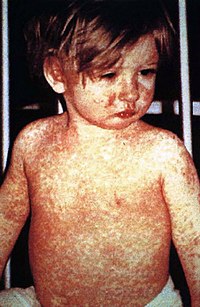
Photo from wikipedia
BACKGROUND Acute post-streptococcal glomerulonephritis (APSGN) is an immune-complex (ICs) mediated glomerular disease triggered by group A β-hemolytic streptococcus (GAS) or Streptococcus pyogenes infections. APSGN represents a major cause of acquired… Click to show full abstract
BACKGROUND Acute post-streptococcal glomerulonephritis (APSGN) is an immune-complex (ICs) mediated glomerular disease triggered by group A β-hemolytic streptococcus (GAS) or Streptococcus pyogenes infections. APSGN represents a major cause of acquired kidney injury in children. METHODS This non-systematic review summarizes recent evidence on APSGN. We discuss the epidemiology, pathogenesis, clinical and laboratory findings, histopathology, treatment and prognosis of the disease. RESULTS The median APSGN incidence in children in developing countries is estimated at 24.3/100,000 per year, compared with 6.2/100,000 per year in developed countries. Nephritis-associated plasmin receptor, identified as glyceraldehyde-3-phosphate dehydrogenase, and the cationic cysteine proteinase streptococcal pyrogenic exotoxin B are thought to be two leading streptococcal antigens involved in the pathogenesis of APSGN, which activate the complement system, mainly via the alternative but also the lectin pathway. This process is critical for the generation of inflammation by the ICs deposited in the glomerulus. The classic phenotype is an acute diffuse proliferative glomerulonephritis leading to features of the nephritic syndrome including hematuria, oliguria, hypertension and edema. The histopathology shows that the glomeruli are diffused affected, mostly presenting enlarged glomerular tuffs due to hypercellularity. Proliferative endothelial and mesangial cells and inflammation are also observed. APSGN frequently has spontaneous recovery. There is no specific therapy, but its morbidity and mortality are drastically reduced by the prevention and/or treatment of complications. CONCLUSION Despite recent advances, the pathogenesis of APSGN is not fully understood. There is no specific treatment for APSGN. The prognosis is generally good. However some cases may evolve to chronic kidney disease.
Journal Title: Current medicinal chemistry
Year Published: 2022
Link to full text (if available)
Share on Social Media: Sign Up to like & get
recommendations!